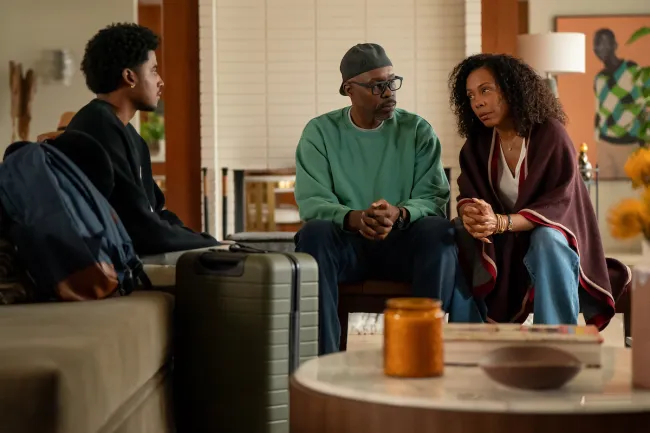Karen Pittman has extensive experience with high-quality content. Whether it’s “The Morning Show” or “And Just Like That…”, she has carved out a niche for herself by portraying compelling characters central to intelligent, socially aware narratives. However, in
Forever
In the new Netflix series, Pittman ventures into unexplored territory—professionally and emotionally. Adapted by
Mara Brock Akil
and executive produced by Regina King, the show reimagines Judy Blume’s iconic 1975 novel through a contemporary lens, centering Black love, family, and the growing pains of adolescence in a pre–George Floyd America. It’s the kind of project that doesn’t come around often—and Pittman knew that from the jump.
I don’t have anything similar in my TV portfolio,” she explains to Efwebe. “I’ve explored such roles in theatre, but never in this manner alongside these specific collaborators.” When Akil reached out regarding the part of Dawn Edwards—an influential financial leader and staunchly defensive parent—she felt destiny was at play. “In one’s acting career, it isn’t common for opportunities to arise where you can challenge conventions and try new things,” she notes. “Plus, Mara has a reputation for highlighting Black women, which resonated deeply with me.
In the show, Dawn serves as the parent to Justin, a young adult exploring his initial experiences with romance, self-identity, and personal freedom. This role pushed Pittman to draw from her innate sense of protectiveness but do so subtly. “While Dawn and I have distinct approaches to being mothers,” she explains amusedly, “I wholeheartedly resonate with her fierce dedication to safeguarding her kids; this unwavering commitment mirrors my own values.” Although Dawn projects the charisma described by Pittman as ‘glamorous flair’—enough to command attention upon entering—a space where vulnerability and internal conflict coexist becomes evident as well. She grapples with unease over relinquishing control duringJustin’s journey toward adulthood.
The series unfolds in 2018, which the Emmy-nominated actress characterizes as “a pre-crisis era.” Prior to the onset of the pandemic and prior to the broad demands for racial equity, the program encapsulates the subtle fears prevalent within numerous African American families. She elaborates, “This represents an unstable situation for a parent, observing their offspring venture into what can feel like an antagonistic environment. The narrative mirrors our nation’s condition at that juncture and underscores Dawn’s intense dedication towards nurturing her son’s development.”
It helps that Pittman’s co-stars include Wood Harris, who plays Justin’s father. The two actors share not just professional chemistry, but a shared language that goes back to their NYU roots. “We spoke fluently with each other,” she says. “Wood was just the perfect gentleman of a co-star—open, accessible, and full of respect for the work. Our characters deeply love each other, and the conflict between them is about noble issues, not petty drama. It made the scenes feel rich.”
The impressive lineup doesn’t stop there. Pittman becomes enthusiastic discussing her direction under King, highlighting how her artistic intuition and firsthand experiences enriched the project. “Regina spent her childhood in Los Angeles and has parented a child around that age—there was incredible alignment,” she explains. “She excels as a director who is firmly in control yet deeply attuned to the crew, making everyone feel solidly anchored.”
However, it’s Akil who established the groundwork, according to Pittman. “Mara has the talent to write for anybody and take on any project, but she decides to focus her efforts on stories about our community,” she explains. “Her intentionality is something I have never encountered before. We’ve witnessed her influence with shows like ‘Girlfriends,’ ‘Being Mary Jane,’ and ‘The Game’—but this new series offers a distinct aspect of her creative vision. It’s gentle yet incisive; profoundly, deeply rooted in Black culture.”
For Pittman,
Forever
It’s not just another entry added to her impressively extensive resumé; it feels like coming back home. An opportunity for growth, working alongside those whose creativity she respects, and sharing a narrative that deeply connects on all fronts.
It’s one of those rare occasions where the task at hand, the team involved, and the core message are all in harmony,” she states. “And once everything comes together like that, you leap into action.
